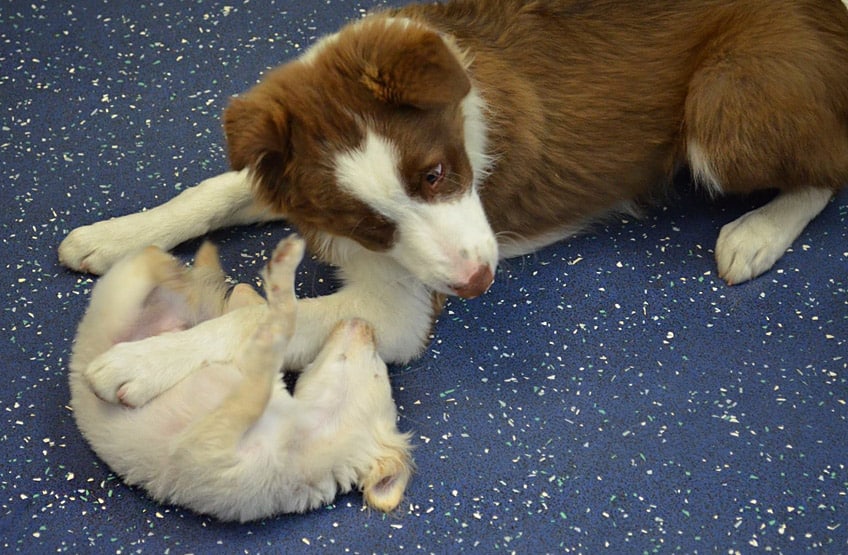Read our guide to help you decide whether you’re ready for a puppy, and to help you prepare your home, and your life, for your puppy’s arrival. Follow our tips and your puppy will grow up into a healthy happy dog, and a faithful friend for life.
Before you get a puppy
Crucial questions to ask yourself You need to ask yourself – am I ready? Do I have enough time, space, and money for a puppy? Am I able to commit to caring for a dog throughout its entire life? Puppies cost a lot of money, and they’ll always cost a lot of money. There’ll always be food, equipment and toys to buy, vet’s bills to pay, kennelling costs, and more. For as long as they live, dogs will always need a significant amount of your time, energy, and commitment.
But perhaps the most important question you’ll have to ask yourself is – what sort of dog would suit my lifestyle? Some breeds are more boisterous than others and will require more mental and physical stimulation. Some mature faster, grow larger or require regular professional grooming. You need to find a breed that’s comfortable taking life at the same pace as you, otherwise behaviour problems can arise.
Preparing your home for a puppy – A shopping list You will need:
- Puppy Food – Make sure you buy a quality brand that’s been specifically made to cater for a puppy’s dietary needs
- Toys – For playing and training, but also to give your puppy something to chew on that isn’t your favourite pair of shoes
- A Collar – Buy one that can be adjusted in size as your puppy grows, and attach an ID tag before you start taking them for walks
- A Lead – For taking your puppy on walks!
- Scoopers & Bags – For when your puppy must answer nature’s call while out on walks
- A Puppy Pen or crate & A Dog Bed – A pen will give your puppy a private space to call their own, which can help with behavioural training, while a bed will give them a comfortable place to sleep
- Grooming Products – Shampoo and a brush will keep your puppy’s coat healthy and glossy
You’ll also need to consider flea treatment and worm treatment. When they first arrive at your home, your puppy will spend a lot of time exploring their surroundings in order that they can get to know their new environment.
You’ll therefore have to puppy-proof your home. Keep anything that’s either valuable or dangerous out of reach – such as exposed wires and priceless family heirlooms – and consider getting some dog gates to set areas where your puppy cannot go.
Helping your puppy to settle in – Those crucial early days
The first day your puppy spends in your home will be as exciting for them as it is for you. So many new sights, sounds, smells, and people – it’s a lot for them to take in, and they’ll have a lot to get used to! Luckily, there are some things you can do to help them to get settled, and to enable them to safely explore their surroundings.
You need to give your puppy an area they can call their own – a place to which they can hide and recuperate should things become overwhelming. As we mentioned above, for this you can use a puppy pen or crate and a dog bed.
When in this area dogs should be left alone and given space, it’s important children understand this. When choosing a puppy pen or crate, consider how large your puppy is likely to grow as they get older, and position it somewhere that’s private, out of sight, and free from drafts. Never force your puppy into their pen or crate or use it for punishment, as this will stop your puppy seeing it as a safe place.
Your puppy might be nervous in their new surroundings. If they still haven’t settled in after a few days, a pheromone diffusing spray or collar can mimic the happy hormones of a content dog, helping your puppy to calm down and feel at home. Other things to do to help your puppy settle in:
- Avoid loud noises and try to keep children calm
- Don’t handle your puppy too much if they seem nervous, and tell your children to take care
- If your puppy appears distressed, sit down and quietly comfort it
- Don’t force them to stay in situations that make them anxious, always go at their own pace. Always be your dogs safety net so they learn to trust that you will keep them safe.
Feeding your puppy
What should you feed your puppy, and how often should a puppy be fed? Smaller portions will be easier for your puppies to digest, and frequent meals will enable your puppies to enjoy a more sustained level of energy throughout the day.
So a good strategy is to go for frequent and small portions over large meals. Puppies have different dietary needs to adult dogs. If you want them to grow quickly and healthily, make sure you choose a brand that’s been specifically made to meet your puppy’s nutritional requirements. Your puppy will already be used to an established eating routine, and you should stick to this to begin with.
But if you want to move them onto a different routine, or even a different brand of food, make sure you make any changes gradually, to give your puppy time to adjust.
Every meal should be accompanied by plenty of fresh, clean drinking water, and their water bowl should be refreshed every morning and every evening.
Toilet training your puppy
When it comes to eating, playing, and sleeping, puppies soon establish something approaching a regular schedule. You should soon be able to deduce just when your puppy needs to go, which means that you can prepare accordingly. Start by defining an area where you’re happy for your puppy to go. This can be your garden, or a specially designed “puppy pad” for the home. When your puppy wakes up, finishes eating, or finishes playing, take them to this space. And once nature’s taken its course, shower them with praise.
Your puppy will then associate relieving themselves in your preferred area with reward, which will significantly reduce the amount of unwelcome accidents in the home.
But remember – the opposite approach won’t work! If you scold your puppy for making a mess, they won’t be able to associate the telling-off with their actions. Instead, they’ll be confused and could potentially become worried about toileting in front of you even where you want them to go, which could potentially undermine any training that’s already taken place, and may result in further accidents in the future or even them trying to hide the evidence by eating it!.
A reward-based system to reinforce good behaviour will always work better.
How to keep your puppy fit, healthy, & happy
Puppies are naturally playful and overflowing with energy. They will never need much encouragement to remain active. Nonetheless, there’s much you can do to help them stay fit and healthy. When you first get your puppy, make an appointment with a vet for a check-up.
While it’s unlikely that there’ll be anything wrong with your puppy, your vet can nonetheless ensure they’re in good health, and address any potential issues long before they become problems. Your vet can then arrange vaccinations, the first round of which should occur at about 8-9 weeks, and the second batch two to four weeks later, and a recommended optional 3rd Parvo vaccination from 16 weeks.
By law all dogs must now be microchipped, so if the breeder has not already done this, this should be done ASAP. Indeed, you shouldn’t even consider taking your puppy out until they’re vaccinated and microchipped, so for as long as they remain at home, it’ll be up to you to find safe ways to keep their minds occupied and burn off their excess energy.
For this you’ll need some nice toys, some food enrichment toys such as Kongs, and some treats to start training as training is a fab way to teach your pup something new and tire their minds. Once they’re ready to head outside, take your puppy for short and frequent walks, as opposed to a long stroll that will just leave them exhausted. An overtired puppy much like an overtired toddler can be very hard work!
What’s next? – The first year
So what comes next? What do you do as your puppy becomes a small dog, then a bigger dog, then a full-sized dog? How can you help them along their journey into maturity and beyond? Consider bringing them along to one of our Puppy clubs for some fun socialisation, and a chance to chat with other owners and get advice on common puppy issues.
Enrol your pup in a good reward based training class to get them off to the best start. Your local Calder branch can advise you on good classes in your area.
We’ve also prepared a checklist which outlines everything you should do at key points throughout your dog’s first 14 months. It’ll let you know when to worm your puppy, when to check for fleas, when to get your vaccinations, and it lets you record your puppy’s weight as they grow.



Our Services